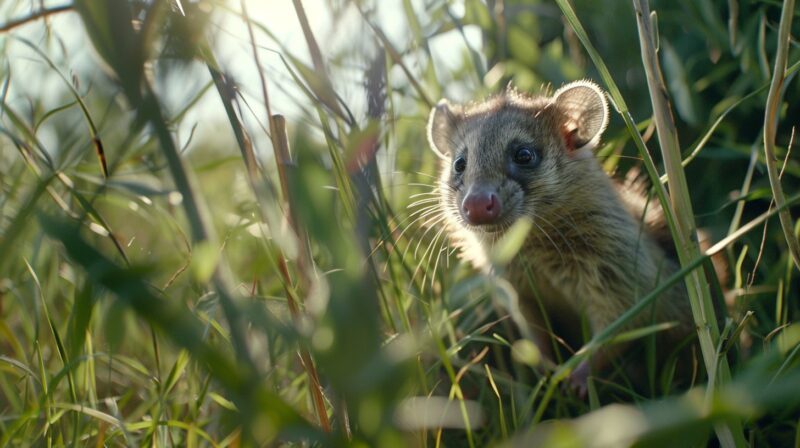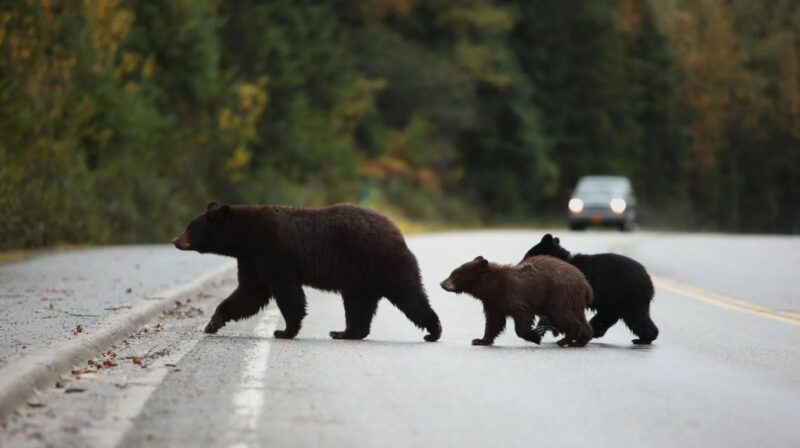Have you ever seen a furry animal with a long snout and a naked tail in your backyard? It might have been an opossum, a shy and harmless creature that is about as big as a housecat.
They are very special animals because they are the only ones in the United States that carry their babies in a pouch.
They are called Virginian opossums, and they have made many people wonder and worry about them. Are they dangerous to us, our pets, or our homes?
The Short answer is no, but there is more to it. Stick around, and I will walk you through this topic.
Key Highlights
- Opossums are not dangerous to humans or pets and typically avoid confrontation.
- They play a beneficial role in controlling pests like ticks and rodents.
- Simple measures can prevent negative encounters and deter opossums from causing property damage.
- Opossums carry a low risk of transmitting diseases to humans or pets with proper precautions in place.
A Glimpse into Opossum Life
Opossums thrive in various habitats, from deciduous forests and farmland to open woods and urban areas, and are easily recognizable by the sounds they make and their appearance.
As nocturnal, excellent climbers, these slow-moving, solitary creatures have adapted well to different environments.
Despite their adaptability, opossums generally aim to avoid confrontation, preferring to keep to themselves. Their lifespan is also very short.
Why Do They Visit Our Backyards?
Often, opossums are drawn to human habitats in search of shelter and food. Their nighttime forays can lead to overturned trash cans or raided birdfeeders, marking their presence.
However, these actions stem from survival instincts rather than any desire to cause trouble.
Interactions
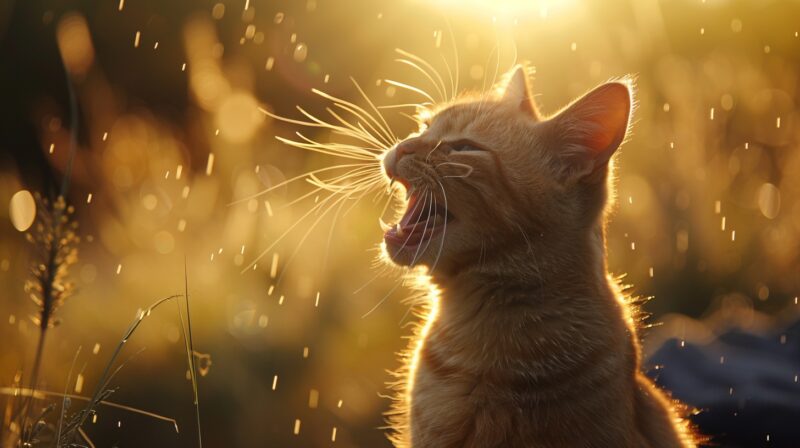
Are Opossums a Threat?
The short answer is no. They do not pose a direct danger to pets or your property. Their peaceful nature means attacks on humans or pets are extremely unlikely.
When confronted, an opossum is more likely to emit a foul odor, lash out if cornered, or, famously, play dead to avoid conflict.
What About Diseases?
While it’s true that opossums can carry diseases such as leptospirosis, tuberculosis, and tularemia, their risk of transmitting these to humans or pets is low.
Their low body temperature makes them less susceptible to rabies, although they can spread other diseases through parasites like fleas.
Proper hygiene and sealing openings in buildings can significantly reduce the risk of disease transmission.
Property Concerns
Yes, opossums may cause some property damage through digging, raiding trash cans, and leaving droppings.
However, severe infestations are rare. Humane deterrents, such as installing motion sensor lights and removing food sources, can effectively reduce opossum visits.
How to Live Harmoniously with Opossums
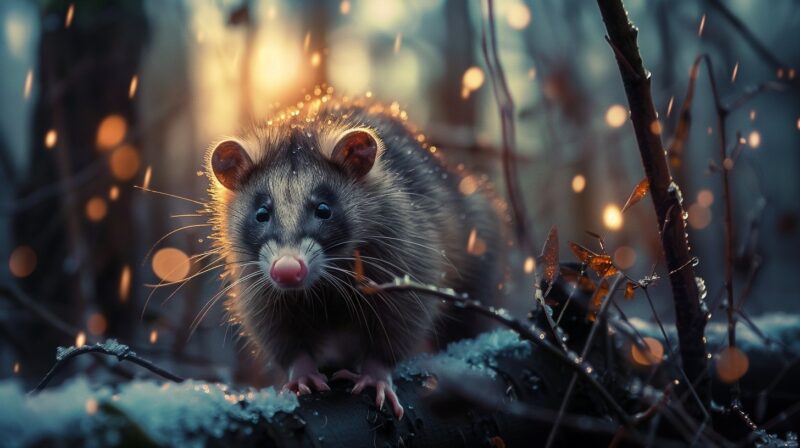
Opossums can be considered backyard allies, contributing to the ecosystem by preying on harmful pests like rats, mice, and cockroaches. To coexist peacefully:
- Avoid feeding them intentionally to prevent habitual visits.
- Secure garbage cans and keep pet food indoors to make your property less attractive to them.
- Utilize sprinklers, motion-activated lights, or a garden hose to gently discourage their presence.
If an opossum makes its way into your home, simply providing an exit or gently shooing it away often suffices. For persistent issues, professional wildlife removal services are a call away.
When Threatened
It’s fascinating that opossums may growl, hiss, or become catatonic to deter predators without resorting to violence. Their behavior shows their preference for peace over conflict.
Preventing Negative Encounters
While opossums are not inherently aggressive, negative encounters can occur if they feel threatened or cornered. Here are some strategies to minimize risks and ensure a peaceful coexistence:
- Create a wildlife-friendly yard: Incorporating plants and shelters that attract opossums‘ natural prey can keep them away from living areas.
- Close off crawl spaces and other potential shelters: This can prevent opossums from nesting in or near your home.
- Handle pet interactions cautiously: While opossums rarely attack pets, it’s wise to supervise pets when they’re outside at night to avoid any potential confrontations.
What if an Opossum Gets Too Close?
In the rare event that an opossum feels cornered and lashes out, it’s crucial to remember that such behavior is out of fear, not aggression. Maintaining a calm demeanor and giving the opossum space to retreat can often defuse the situation.
Opossums and Disease
Concerns about diseases carried by opossums are valid, yet the actual risk to humans and pets is minimal. To further minimize these risks:
- Practice good hygiene: Washing hands after any potential contact with wildlife or their waste can prevent disease transmission.
- Vaccinate pets: Ensure pets are up-to-date on vaccinations, especially if they spend time outdoors.
- Manage waste and food sources: Keeping your yard clean of waste and securing food sources can reduce the likelihood of opossums spreading parasites or diseases.
The Benefits of Having Opossums Around
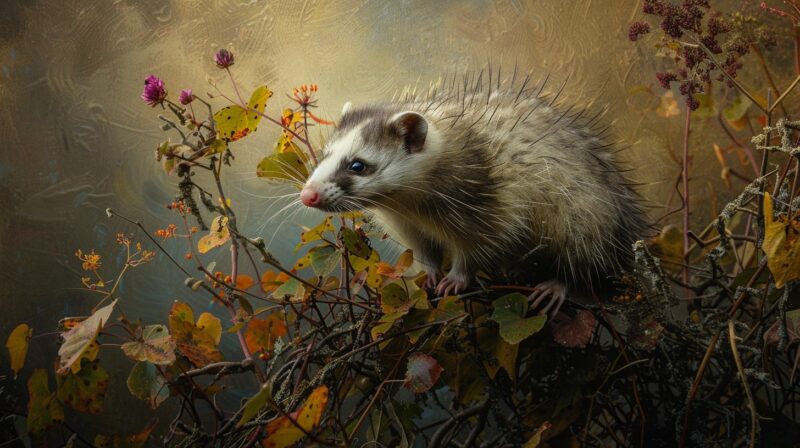
Despite the potential for property damage and disease, opossums play a beneficial role in our ecosystems.
Their diet includes ticks, which can significantly reduce the spread of Lyme disease, and other pests that can damage gardens and outdoor spaces.
How to Humanely Deter Opossums
For those looking to deter opossums without causing harm, consider the following humane methods:
- Use natural repellents: Ammonia-soaked rags or garlic can act as natural deterrents.
- Employ scare tactics: Fake owls or snakes can create a sense of danger for opossums, encouraging them to stay away.
- Fence off gardens: A simple fence can prevent opossums from accessing plants and food sources.
FAQs
Can opossums become pets?
No, they are wild animals with specific needs and are not suited to be domestic pets.
Do opossums eat ticks?
Yes, they eat a large number of ticks, helping control tick populations and reducing the spread of Lyme disease.
How long do opossums live?
In the wild, they typically live for about 2 to 4 years due to predation and environmental factors.
Can opossums climb fences?
Yes, they are excellent climbers and can easily climb over fences to enter yards or escape predators.
What should I do if I find an injured opossum?
Contact a local wildlife rehabilitation center or animal control for assistance. Do not attempt to handle an injured opossum yourself.
Are opossums active during the day?
They are primarily nocturnal but may be seen during the day, especially if they are searching for food or if a mother is foraging with her young.
Final Words
Opossums are not the scary animals that some people think they are. They usually don’t bother us or our pets when they visit our backyards.
We just need to be careful about keeping them healthy and safe, and they will help us by eating pests and cleaning up the environment.
Let’s not forget that wildlife deserves our respect and care and that we can share our outdoor space with all kinds of animals, even the opossums that are often judged wrongly.
Related Posts:
- Are Opossums Dangerous to Humans? Unmasking the Truth!
- What Are the Predators of Eagles? -Surprising…
- What Sounds Do Raccoons Make? - Meaning and How to…
- 5 Reasons Whales Are Mammals Not Fish - What Sets…
- 10 Most Dangerous Birds Of North America - Predators…
- Do Beavers Make Good Pets? What You Need to Know…


